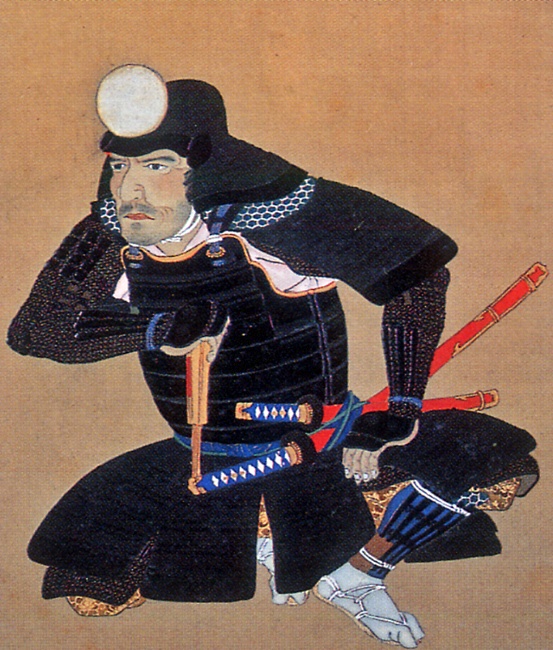
Gotō Mototsugu 後藤 基次, also known as Gotō Matabei 後藤 又兵衛, was a famous brave samurai of the late Sengoku periods. He served Kuroda Kanbei 黒田 官兵衛 and Kuroda Nagamasa 黒田 長政 first and then Toyotomi Hideyori 豊臣 秀頼. He was killed at the battle of Dōmyōji during the siege of Osaka in 1615.
During the siege of Osaka, Mototsugu was one of the most able and fierce generals just like Sanada Yukimura 真田 幸村 in Toyotomi Hideyori’s Western Army.
He was the chief commander at the battle of Dōmyōji where, severely outnumbered by Date Masamune troops, he held out for reinforcements, which were lost in the fog. Unable to maintain the position without the reinforcements, Mototsugu was harmed by a stray bullet and unable to stand, he practiced seppuku.
After his death, Mototsugu’s samurais were easily defeated and his head discovered by enemy forces. History said that his display of valor this day was great enough to shock everyone, allies and enemies : leading his warriors in hit and run tactics, he killed 70 to 80 horse-men by himself. He stopped only because his horse was exhausted and he needed another to continue the fight.
Samurai traditionally have several names. (learn more) They change their name to fit different situations and life stages. This was normal within the Samurai rank.
The transition of his names are as follows.
弥八郎→後藤又兵衛基次→後藤隠岐守基次→後藤又兵衛年房
1. 弥八郎
Yōmyō 幼名, childhood name
n 弥 八郎
reading: ya, hachiro
meaning: vibrant, eighth guy
弥 is an eulogistic name for man and 八郎 means eighth guy. But he was believed a second son of Goto Sinzaemon 後藤 新左衛門 which confused his name origin. Generally, like Sanada Genjirō 真田 源次郎, Jirō 二郎 or 次郎 is named to a second boy, but his name implies his birth order is eighth. One theory suggests that the childhood name of his ancestor was Yahachiro 弥八郎 and his father named it to Matabei in order to share the good luck of the valor of the ancestor.
2. 後藤 又兵衛 基次
Myōji 名字, family name
後 藤
reading: go, tō
meaning: back, wisteria
Kemyō 仮名, pseudonym
又 兵衛
reading: mata, bei
meaning: help, guardian
Jitsumyō, true name
基 次
reading: moto, tsugu
meaning: base, second
History tells nothing about when he had a coming-of-age ceremony (元服 Genpuku), and why he named himself Gotō Matabei Mototsugu 後藤 又兵衛 基次.
又 originally means “right hand” and then “help”; 兵衛 means “guardian” well-used among Samurai rank; 基 means “base”; 次 means “second”. So, his father might hope for his second son to be an unshakeable samurai who can help and protect someone. Matabei grew and studied the way of samurai under his lord Kuroda Kanbei. He became one of the strongest samurai soldiers in Kuroda’s retainer.
3. 後藤 隠岐守 基次
Myōji 名字, family name
後 藤
reading: go, tō
meaning: back, wisteria
Kemyō (仮名), pseudonym
隠岐守
reading: okinokami
meaning: the governor of Oki Province
Jitsumyō, true name
基 次
reading: moto, tsugu
meaning: base, second
Matabei became the keeper of Masutomi castle 益富城 in Chikuzen Province and got a title called Okinokami 隠岐守 because he received recognition for his military excellence as one of the best commanders at the Battle of Sekigahara 関ヶ原の戦い.
He might called himself officially Goto Okinokami 後藤 隠岐守 by leaving the Kuroda family.
It was very honorable among samurai to add the official court rank of samurai family to his name
4. 後藤 又兵衛 年房
Myōji 名字, family name
後 藤
reading: go, tō
meaning: back, wisteria
Kemyō 仮名, pseudonym
又 兵衛
reading: mata, bei
meaning: help, guardian
Jitsumyō, true name
年 房
reading: toshi, fusa
meaning: matured, bunch
His lord, Kuroda Nagamasa had a jealous side: when his father Kanbei died, he expelled Matabei, who had received daimyo-level hospitality from Kanbei; and furthermore, he carried out measures called Hōkōkamae 奉公構, a kind of punishment.
Matabei had the door closed for serving another daimyo due to the Hokokamae and ended up participating on the side of Toyotomi in the Siege of Osaka. He might change his true name to Toshifusa at that time, meaning “matured bunch” .
He gained fame as one of the main commanders of the Toyotomi side and was dead in the Battle of Domyoji by a gunfire from Date Masamune’s troops. His brave fight was praised by both sides and the name Matabei was handed down to posterity.
If you want to get your own samurai names like the above, click the bottom below. I can put your principle into Samurai names according to the information you provide.




Leave a Reply